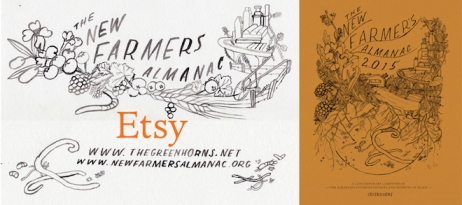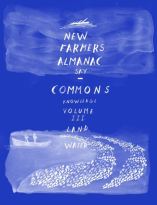

Greetings writers, artists, photographers, agrarians! It’s almanac time again! If you would like to contribute to the next volume of the Almanac, now is the time to get thinking, writing and creating agrarian content. This year we have a wonderful new editor Briana – you can contact her with your ideas and submissions at almanac@thegreenhorns.org. Please see below for more details about the submissions process as well as our guidelines for themes for the upcoming Almanac.
Submission Guidelines:
Deadlines
– ASAP/ By the End of December: Send a quick description of what you want to submit to almanac@thegreenhorns.org. If we’re amenable, we’ll invite you to submit via a google form.
– February 28 will be the deadline for completed submissions.
Written Submissions
Send us essays, interviews, recipes, ruminations, reading lists, rants, star charts, stories, instructions, jokes, thoughts, dreams, or other curious textual things. For prose, 700 words (give or take) is our preferred length. If you’re submitting poems, give us up to three to consider. If your work defies such categories, aim for one page, or two, or three (but no more than that unless we ask).
Visual Arts Submissions
Send us your photographs, original art, illustrations, picture essays, flowcharts, diagrams, maps, doodles, or natural world paraphernalia. Whatever your medium, materials should be submitted as 300 dpi grayscale images, formatted as .tiff, .png, or .jpg files. With each piece, please specify artist name, name of work, and medium.
Farmers React
We will solicit your reactions to selected art works early in 2018. Let us know if this form of writing calls to you.
Themes and Challenge Questions
As usual we have laid out some themes as a scaffold to inspire and provoke your Almanac contributions. You can ignore them, or you can rebut them–but it does seem to work well when we have some consonance within the chapters.
The overarching theme of this year’s almanac is a bigger, broader WE. The motto we’ve chosen is: Together WE can make the Almanac (and agriculture) great for everyone. As Marada Cook always says: “Food is physical”–and the physical proof of a series of inter-linked land actors–so when Aldo Leopold talks about “Land as a community to which we all belong,” it’s perhaps not too dumbed-down to recognize ourselves and one other as both inextricable beneficiaries and victims of land-use decisions. Directly or indirectly. Now or sometime soon. What fictional and exclusive “We” that sees itself apart from the coiling, uncoiling, and recoiling of nature’s news may exist in TV newscaster and consumerist narratives, but this is a shrinking and fortified minority–a miserable abstract demographic otherness.
We therefore challenge ourselves to look straight at the question: “Which WE are WE? And how can we work more together in that WE?” Aren’t WE the settler-homesteaders, aren’t we the dispossessed Irish, Scottish, Mexican, and Caribbean diasporas who arrived penniless on ships? Aren’t we the re-settled Japanese or Chinese coolie-workers? Aren’t we the trail-guard cavalry or buckboard opportunists with a pick-axe? Aren’t we those enslaved for sugar or cotton? Aren’t we the offspring of oppressors and oppressed? Aren’t we the H2A guest workers, or undocumented and fearing the traffic cop? Aren’t we the kids on the Reservation, or orphaned from it by bureaucracy? Aren’t we those chased over the border by structural adjustments, refugees of the “Green Revolution”? Are we not All of these?
Aren’t we all citizens of this same landscape, voters in our watersheds, stewards in the neighborhood, committee members to a changing climate? Isn’t that the WE we are talking about? The bigger broader inclusive and all-encompassing WE, the WE it will take to turn this situation around. The hearts and minds and shovels and sandbags, the libraries and ambulances, the pollination and aquifers, the relief efforts and scar commons that will take part in the distributed volition and immediate reactions to crisis near and far. WE collaborators who can relate with one another alongside, not one-sidedly, in this our shared project of survival.
The editors of this year’s New Farmer’s Almanac challenge you, dear authors and agrarians, to consider the WE. To name your subject, your object, your actions and your place in the ecosystem of successional, emergent, spontaneous, collaborative and altru-opportunist future-making that lies ahead.
January
What story are WE?
Reflections on the Trump era, local practices, resilience-based organizing. Tuning in, Tuning out–coping strategies, adrenaline and keeping it real.
– Peace Economy, relations in a small town.
– Peace Economy, relations in the big city.
– Peace culture, non-violence and relating through conflict.
– Peace culture–relating across histories with hispano/indigenous water rights.
– Radical Extension–a thought experiment on how the Extension service might operate in the future, imagine the role of community testing plots for new crops and varieties.
– Punk Extension–a thought experiment on how communities might self organize to do crop research and form adaptation strategies on next crops…
February
Age of SAIL
Looking across the bow at a new economy–a report from the International Sail Freight Alliance.
– How do we orient (post-colonially) to the logic of the landscape, the harbor, the river-system, the portages and canal-making.
– Bodies in Motion/Thoughts on animal movement, human migrations, and the finding of habitable habitats in our beleaguered world.
– Re-negotiating terms of trade.
– Re-negotiating settlement norms.
– Looking at the cargos pre-diesel:Sandalwood, Potatoes and Sardines to the California Gold Rush, Opium and tea Trades, Chilean Nitrate, Russian Hemps, Chinese Silks, Tropical Hardwoods, Masts and lumber, Molasses and Rum, Ice to India. Pick a story, go research it– and tell us what you learn of its enduring consequence.
– Wobbling docks, longshoremen, and the Wobblies.
– Some thoughts on Partnerships and LLCs.
Book Review.
March
Age of TRAIL
Criss-crossing the plains and passes. Please choose one and teach us about it.
– The role of the US cavalry, native treaty negotiations, and broken promises. Fort Laramie.
– The history of trade along the Santa Fe Trail.
– Jedediah Smith and the Beaver trade.
– Forts–Fort theory.
– Fording the rivers, taxes, veins, caches, the Cumberland Gap.
– Research Project: Comparative legal infrastructures of Pastoralism (i.e. Seven North African nations agree to allow their pastoralists to travel freely between the nations without harm).
– Forgotten words, “Land Marks” of animal passage.
– Beginners’ guide to Fruit Exploring.
– Tracking on the farm, using spoor and knowing the wild life.
– Quaker Underground, apples, and peace.
Book Review.
April
Age of RAIL
Farmers Cooperatives, especially the sheep/goat cooperatives of Texas and Colorado, a micro history.
– Hoard’s Dairy, the Wisconsin cooperative milk delivery history.
– The Oak Savanna, and its analogues (Savanna Institute).
– Cattle hubs and spokes, slaughter, hides, buffalo robes.
– Oil Trains, a report from Wisconsin on the rail freight of fracked shale gas.
– Vision for bio-myco-remediation of contaminated railroad lands.
Book Review.
May
FAIL
Failure
Failing
Exploring trauma in relation to extreme weather.
– Fraternity, exploring the themes, rituals, economic relations and underlying lessons of Fraternal orders in the US.
– Stories from Grange revivals and dissolutions.
– Healing from Lyme.
– What went down with the California “Green Grange Movement.”
Farmers react: ART PIECE.
June
Faith Lands
Testimony from farmers working within religious communities, or on church-owned lands.
– A report from the Catholic Workers Movement.
– Report from Puerto Rico/Caribbean relief work.
– Report from the American Friends Service Committee.
– Culinary Seed Breeders Network.
– Sandhill Cranes, migration and the Federal Wildlife Reserve system (GMOs?).
– Super PACs–back to the land as a progressive political strategy, Brian Donahue…
Farmers react: ART PIECE.
July
Labor forms, Labor arrangements, Negotiating power.
Sharecropping
– Illustration: Comparative value systems for shared profit models (East India Company, Letters of Marque, Whalers, Merchant-ships, Sharecropping arrangements) (cotton, pecans, wheat ground, marijuana cartel). *Will require some research and interviews.
– Illustration: Peasant holidays secured in different feudal arrangements, concessions for subsistence alongside service to the estate/center of power.
– Overview of the H2A system.
– Description of the Student Loan Forgiveness program.
– Illustration: Photos of Sharecropper houses, photos of sugar cane workers, photos of Mockabee farmworker houses, photos of farm apprenticeship housing, photos of mini-houses, photos of prairie homesteads, photos of worker trailers.
– Sharecroppers Union formed Southern Federation of Cooperatives, the legacy and the work ahead.
Farmers react: ART PIECE.
August
Reparations
What would a Restoration Economy look like? And would it pay as much as videography?
– Confronting racism in the food system.
– Sherman’s Order.
– Solidarity practices.
– Thought experiment: What would it look like if the Food Deserts got a Land Trust, and elected to protect their agricultural foodshed?
– Intersectionality.
– Acequia stories: Hispano/Indigenous water rights issues in the Southwest.
Book Review.
September
Marijuana culture
– Marijuana philanthropy, small town politics.
– Market limits…Who will smoke it all?
– Race and enforcement, legalization for whom?
– CBD recipes and markets.
– Venture stoners.
– Discussions about warehouses, hydroponics, and the future of ‘organic’.
Book Review.
October
Genetics
– Population breeding, a report on the work in Italy.
– Adaptation, how does nature learn?
– Assisted migration theory, SW Seed Partnership botanists explain their work collecting seed from native populations for restoration practices.
– Personal audit, who are my people? Which WEs am I?
November
Native Sovereignty Movements
– The work ahead.
– Native food products, aggregation.
– The story of Chimayó chiles.
– ‘First foods’.
– About the Huckleberry Commons of Mt. Hood.
Book Review.
December
Scar Commons
Looking at the forms of human coping post-crisis, post-displacement. How we reformulate ourselves into coherence. Reactive institution-making.
– Refugee farms, Alcoholics Anonymous, Syrian Seed bank project, Community Centers in the old rural schools, and on.
– Personal reflections on healing from trauma.
With thanks,
Briana Olson – Lead Editor
Severine vT Fleming – Director of the Greenhorns
Katie Eberle – Visual Editor
Emma O’Leary – Office Manager















